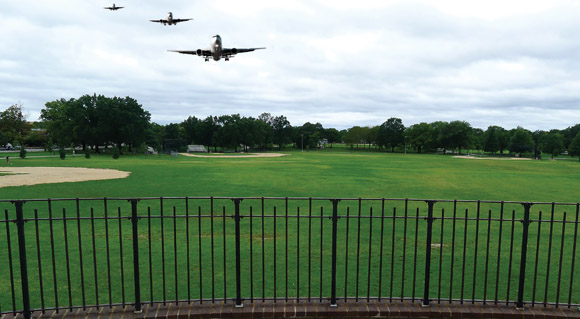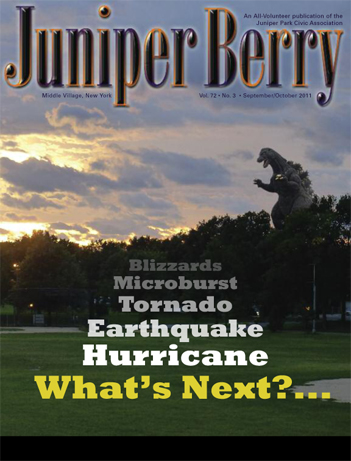While talking to my neighbor yesterday over the fence in our Middle Village alley, we went through a familiar routine: having to raise our voice, practically shouting, every 90 seconds so that we could be heard over the sonic boom of jets flying overhead in their flight path into LaGuardia Airport.
As usual, these planes are breaking all the rules: they’re straying far off the L.I.E visual approach they are supposed to be on, they’re flying below minimal approach heights and they are nailing us here in Maspeth and Middle Village sometimes three or four days in a row in an unrelenting barrage of 90-second noise waves.
I’m the third generation of my family to live in Middle Village (my grandparents came here in 1938), and I’m fully aware, as you are, that it ain’t Kansas. Perhaps you’re thinking: Okay, but aren’t airplanes one of the necessary drawbacks of living in the New York City we all love—as we rightly should!— alongside other annoyances like a screeching F-train, the Q-38 coughing along Eliot Avenue, or the Yanks or Mets losing in extra innings because of an umpire’s utterly ridiculous call?
Not on your life. Airplane noise and the jet-fuel pollution dropping on our heads exact a toll on our sanity, our children’s health, and our property values. And, as anybody who has lived here for a while knows, it’s getting worse. This is a case of what-you-don’t-know-can-hurt-you, and I’m going to tell you in a minute both how badly you can be hurt, and also what we can do together to stop this threat.
Beyond our control?
But first a little story about a frog. Perhaps you’ve heard it: If you drop a frog in a pot of boiling water, it will of course attempt to clamber out. But if you place it gently in a pot of warm water and turn the heat on low, it will float there quite placidly. As the water gradually heats up, the frog will sink into a tranquil stupor, like a person in a hot bath. Before long, with a smile on its face, the frog allows itself to be boiled to death.
This tale may not be literally true. But the boiling frog illustrates a scary fact: As airplane traffic over our heads has gradually amped up through the poorly conceived LIE visual approach into runway 31 at La Guardia (not to mention the less frequent, earsplitting “Maspeth Climb” departing the airport) we’ve slowly become accustomed to it. And it may increase further with new plans to expand LaGuardia. Even as the water is about to hit the boiling point, we shrug off the planes as beyond our control.
But is it?
Asthma Alley
La Guardia Airport admits it’s dropping fuel on us. That fuel, along with plane fumes, may be invisible to the eye but it contains nasty stuff like carbon monoxide, ozone, nitrogen oxides, and volatile organic compounds.
According to an array of studies, the public health impact of jet air-pollution may include respiratory problems, flu-like symptoms, allergies, chronic raspy or sore throat, and eye and skin irritations. Oh, and did I mention asthma?
Our area of Queens has been dubbed “Asthma Alley” because of the high rates of that condition, evidently linked to what Robert Holden calls the “triple whammy” of the expressway, diesel trucks, and, of course, jet fuel pollution.
Take a moment to watch the real-time flight of planes into La Guardia at Airport Monitor (http://www4.passur.com/lga.html). You’ll note how unnecessary and circuitous the landings over the terribly conceived ‘LIE Visual Approach’ are. You’ll also see the abhorrent frequency of the planes. And you can practically see the pollutants smothering us.
The EPA says, “nearly 1 in 13 school-age children has asthma, and that rate is rising more rapidly in preschool-aged children than in any other group. Asthma is the leading cause of school absenteeism due to a chronic illness. Ozone pollution may trigger asthma attacks.” You’ll recall that ozone is one of the pollutants from the planes.
The Noise
Then there’s the noise. Elevated noise from airplanes can cause hearing impairment, hypertension, ischemic heart disease, annoyance, sleep disturbance, and decreased school performance. Elevated noise levels can increase workplace accident rates, create stress, and increase aggression and other anti-social behaviors.
A major statistical analysis of the health effects of aircraft noise was recently undertaken by Germany’s national environmental office. The health data of over one million residents around the Cologne airport were analyzed for health effects correlating with aircraft noise. The study concluded that aircraft noise “clearly and significantly impairs health, with, for example, a day-time average sound pressure level of 60 decibels increasing coronary heart disease by 61% in men and 80% in women.” And “a night-time average sound pressure level of 55 decibels increased the risk of heart attacks by 66% in men and 139% in women.”
A number of studies have shown that aircraft noise exposure impairs cognitive performance in school children. In these studies noise exposure has effects on complex cognitive tasks such as reading and, in some studies, long-term memory.
As if this weren’t enough, our property values are under threat. One of the most accepted valuation method for aircraft impact studies, the fancily-named NDSI (Noise Depreciation Sensitivity Index), tends to show a one percent loss in property value per one decibel increase in noise. That means more plane noise, less money for your home. Makes sense, right? For a neighborhood to attract higher home prices, it’s sort of helpful not to have earsplitting jets coming overhead every 90 seconds, causing decreased health and well-being. So what are our options?
What we can do
We must come together as a community to force our elected officials to make the planes come in, as they should: the direct route over water, rather than the circuitous route over our communities. (The L.I.E. approach goes over three times as many houses as one coming in over water.) As a spokesman for Rep. Joseph Crowley put it (the italics are mine): “We’re hoping that with the air space redesign that they will take into account to reroute planes over water and not people’s houses.”
Gee, glad to hear our politicians are hoping to do the obvious. Can they translate hope into action? Only if we get more involved in this and make them feel the heat.
There are several things you can do. First, the September 13th special election is a perfect storm moment to ask the candidates where they stand on limiting airplane traffic overhead. We need to put this on their radar.
Second, the onus is on us to contact our other elected officials and tell them: We want less air traffic and less pollution.
Third, please take a minute to write to me (bill@williampowersbooks.com) and tell me how you feel about this issue. Have you felt any of the negative effects mentioned above? I’ll take your concerns and wrap them into Part II of this series on airplane noise and pollution in our community.
Fourth, if you are concerned about this we should form a group under the JPCA (a kind of Juniper Valley Airplane Watch) to discuss options to move this forward through these steps: meeting with FAA and Port Authority officials to show our concern; analyze how proposed changes to La Guardia airport will affect what happens over our homes; figure out how to keep pressure on politicians. If you are interested, let me know: bill@williampowersbooks.com.
Let’s not boil to death like the proverbial frog. We can prevent our community from declining into Asthma Alley. We can stop the drop in our property values and create a peaceful sense of neighborliness, uninterrupted by the dangers of jet noise and pollution. But it has to start with us.
About the writer: William Powers of Middle Village has worked for over a decade in development aid and conservation in Latin America, Africa, Washington, D.C., and Native North America. From 2002 to 2004 he managed the community components of a project in the Bolivian Amazon that won a 2003 prize for environmental innovation from Harvard's John F. Kennedy School of Government. His essays and commentaries on global issues have appeared in the New York Times and the International Herald Tribune, and on National Public Radio.
Mr. Powers has worked at the World Bank, and holds international relations degrees from Brown University and Georgetown's School of Foreign Service. A 2004-2005 recipient of the Open Door Foundation for non-fiction, he is the author of the Liberia memoir Blue Clay People, the Bolivian memoir Whispering in the Giant's Ear and the memoir of living “off-the-grid” in a twelve-foot-square cabin Twelve by Twelve: A One-Room Cabin Off the Grid & Beyond the American Dream. He is currently based in New York City, and is freelance writer, speaker, and senior fellow at the World Policy Institute.



